- Home
- Seanan McGuire
Alien Artifacts Page 29
Alien Artifacts Read online
Page 29
“Drones coming up on object now,” Cherie announced, her fingers tapping the screen to bring up the list of unrecovered probes and satellites that had been provided by their superiors. Exactly how one of these lost and presumed destroyed satellites or deep space probes that had been launched into the far reaches of the galaxy were supposed to have turned around and come back home was unclear, but their bosses wanted to be absolutely certain they ruled out the possibility.
In unison, the drones’ lamps turned on, illuminating the probe and transmitting the images they received as they flew a standard damage-check protocol. The probe had clearly been travelling for quite some time, and had sustained numerous fine scratches and pock marks from debris. Even passing through an asteroid belt would be unlikely to have left that many marks. It must have passed through many asteroid belts or passed through the debris fields of many planets. Given how few of those there were in this area of space, it might have been traveling for hundreds or even thousands of years.
The central cylinder was a silvery metal—from the spectral analysis, probably stainless steel—marked with golden plates affixed in some manner to the hull. A drone passed directly over one of the plates, its lamp casting the etching on the plate into sharp relief.
Cherie captured the image and marked it for later study. She also captured images from other drones of the conical sections and the panels on the ends of the spokes.
“Look at how those panels are oriented to the sun,” Tomas said, his fingertip hovering above the screen. “They’ve got to be solar cells.”
“That explains two of the pairs,” Syrah agreed. “But what about the third pair? They’re made of a different material, and have a different orientation.”
“Maybe they capture other forms of radiation, when the probe is out of range of a star?” Cherie suggested.
All too soon, the drone flight completed its inspection and turned around to come back to the station. As the drones passed the mysterious pair of panels, the probe shifted their orientation slightly. A moment later, the closest drone’s view went dark and the views from the other drones filled with a flash of light, before they all faded to black. An ominous “Loss Of Signal” message glowed in the center of each.
“Did they hit it?” Syrah asked, leaning forward as if she could coax an answer from the screen by sheer willpower. The drones hadn’t seemed close enough to strike the probe. But maybe there had been some thin extensions, like antennae, that hadn’t been visible. Unlikely, but far more likely than simultaneous system failure.
“I think it hit them,” Cherie muttered, calling up a variety of status and diagnostic programs. “But I have no idea with what. There was no transmission from the probe recorded along any of the known wavelengths. No visible light waves, no infrared, no ultraviolet, no radio waves, no X-rays, no gamma rays, no micro waves. So what was that flash?”
Tomas frowned. “An ion engine exploded.”
“They all did,” Syrah corrected. She swallowed her burgeoning panic at the thought of the probe wreaking similar destruction among the helpless mining facilities. She had a problem to solve.
* * *
Syrah rubbed her eyes and took a swig of her strong, black tea. She needed far more caffeine than she could get from hot chocolate. The entire team had been working overtime, using their off-shifts to run simulations and develop scenarios for dealing with the alien probe.
Of course, the contradictory instructions they were receiving from the higher ups didn’t help. First, they were supposed to develop a method of inspecting the probe that didn’t result in the destruction of the observers. Next, they were supposed to develop a method of destroying the probe. Then, they were supposed to find a way to preserve the probe—and preferably themselves, although the instructions were infuriatingly vague on that point—and capture it for observation by scientists sent from Earth.
Maybe she’d be better able to focus if she could get a decent night’s sleep. However, the damn Mozart tune wouldn’t leave her alone. If anything, it had gotten louder, as if her subconscious was trying to drown out her worries by upping the volume.
That was probably the most annoying aspect of all the additional work they were doing—even more annoying than the fear for the future of their planets from an unknown weapon hurled their way by a mysterious alien race. After all, the whole reason the L-RIPS stations existed was to identify and avert dangers from space. This wasn’t quite what they’d planned for, but it was still in the acknowledged realm of possibility. Having no free time to perform a comprehensive music search so that she could listen to the entire piece and finally get rid of her earworm was cruel and unusual punishment.
She gulped more tea, and began her next set of calculations. A soft chime indicated that the results of a previous data set were ready for review. She saved her work, and pulled up the results.
The computer had tracked the probe for long enough that it had been able to generate an estimation of its orbit. It would indeed pass near Earth, its slow rate of movement keeping it within range of Earth’s orbit for years, although it would never get close enough to the planet itself to risk being pulled out of orbit by gravity.
Her shoulders sagged as the tension gripping her eased. Earth, not the mining facilities. There was no danger of politicians or corporate managers writing off the destruction of Earth as an unavoidable loss.
The estimated orbit should reassure the higher ups. The easiest solution to allow the probe to be examined by Earth scientists, then, was to simply let it pass by the L-RIPS station. The scientists could then use shuttles and other near-space craft to investigate it at their leisure. Of course, until her team figured out what had caused the drones to explode, none of the scientists would take that risk.
A second flight of drones had been dispatched, in a wide arc that steered well clear of the probe’s path, to recover the remains of the first drone flight. They should be reaching the site of the attack soon, and would return with their findings within a week.
Curious, she asked the computer to run the orbit calculations in reverse. Perhaps they could determine where the probe had come from. She wasn’t sure how that would help, but at this point, any real information was better than blind supposition.
By the time she’d finished another gulp of tea, the computer had the calculations completed. Two sets of calculations. One if this was the first time the probe had entered their solar system, and one if it had been captured by the gravitational pull of the sun and was completing an elliptical orbit from a previous visit.
“A previous visit?” She stabbed the choice with more force than the computer deserved, and stared at the screen in disbelief. Assuming a full orbit to match the segment observed so far, the probe would have passed through Earth’s area of space sometime between 1760 and 1790.
She flung herself backward, away from the screen. Only the locking mechanism on her seat kept her from falling to the floor.
“Mozart,” she whispered. Born in 1756, died in 1791. Whose music she had started dreaming about when the probe appeared.
Was it possible that she was hearing the probe in her sleep? The same probe that Mozart had heard in his?
“No. That’s crazy. I’m just tired, and imagining things.”
Still, she could rule it out easily enough. The station monitored their vital signs, including simplified brain wave function, so that the team would know if any member of the crew was physically impaired from carrying out their tasks. All she had to do was review the past week of readings during her sleep shift...
Syrah’s fingers were entering the commands before she’d even consciously decided to run the test.
The results appeared on the screen, the differences before and after the probe’s arrival dramatic and incontrovertible. Her brain was responding as if she was listening to music in her sleep.
She pulled up her crewmates’ readings, and compared them to her own. While they both showed a slight alteration, it was nowhere near as
dramatic. Either they had been able to ignore the music, or they hadn’t “heard” it as clearly as she had.
Which raised another question: how was the probe transmitting the music? Sound didn’t carry in space.
Syrah keyed in the command to locate Cherie, and activated the transmission protocol. “Cherie, can you come up to the command center? I’ve got something, and need another pair of eyes on it.”
“Not another probe, is it?” The communications transmission clearly carried the tremor in Cherie’s voice.
“No. But I’ve got an idea about what might have happened to our drones.”
“Be right there.”
In a matter of minutes, Cherie joined her in the command center. Damp spots on her suit indicated that Syrah had interrupted her daily workout, still mandatory even with all their extra assignments.
Quickly, Syrah outlined what she’d learned. Cherie was initially skeptical, but the brain wave patterns convinced her as thoroughly as they had Syrah. At least, they convinced her that Syrah wasn’t just hallucinating from lack of sleep. But she didn’t see the connection.
“You said this had something to do with the drones. How?”
“What if the probe was broadcasting the music some way, and it overloaded their receptors? We’ve been assuming the ion engines exploded. But what if that wasn’t it at all? What if their sensors shorted out?”
“Why wouldn’t they have shorted out as soon as they got close, then?”
“Remember how the third set of panels rotated as they came back around? The probe might have been programmed to ignore things moving past it, unless they behaved in a non-natural fashion, which the drones did when they turned and came back around for a second pass. It might have been trying to communicate with them.”
“I suppose it’s possible. We’ll know more when the second drone flight recovers what’s left of them.”
“Right. And in the meantime, I’ve got an idea.” Syrah wiped her damp palms on the legs of her flight suit. She didn’t like the idea. Hated it, as a matter of fact. But the need to understand outweighed the need for temporary safety. “So, we know I’ve been ‘hearing’ the probe in my sleep. What if it can ‘hear’ me, too? I’m going to fill my head with music while I sleep, and see if it responds.”
“I don’t like it. There’s too many unknowns.”
“Do you have any better ideas?”
“No. I don’t even have any worse ideas. But that doesn’t mean I have to like yours.”
“Noted. But I’ve got to try it. I can’t stand the thought of aliens beaming things into my head and not being able to do anything about it.”
“Well, when you put it that way…I guess we can use the time before your sleep shift to set up monitoring protocols, and try to figure out what exactly is happening.”
“Thanks!”
* * *
Syrah inhaled deeply, then slowly released her breath on a gentle exhale. It had been years since she needed her breathing exercises to get to sleep. Of course, wearing a monitoring cap that measured every blip of her brain waves was stressing her out. Not to mention the whole attempting to communicate with an alien probe that had fried the drones when they caught its attention. No, no worries to keep her from falling asleep.
She breathed deeply again, then flipped on the music she’d chosen: Mozart’s Twelve Variations on “Ah vous dirai-je, Maman.” Otherwise known as “Twinkle, Twinkle, Little Star.”
The simple, repetitive tune would help to relax her and put her to sleep. And the variations would clearly demonstrate to anyone listening that there was conscious thought behind the music. At least, that was the plan.
One last deep breath, then she closed her eyes, and let the music sweep her away. Twinkle, twinkle...
She bolted upright out of a sound sleep when the music was interrupted by a loud and insistent warning klaxon. Yellow urgency lights blinked on the wall panel.
Syrah ripped the monitoring cap off as she jumped out of bed. She slapped the panel, and engaged com-munications to the command center.
“This is Syrah. What’s the emergency?”
“Your little experiment to communicate with the probe worked,” Tomas answered. “It just shifted course. We don’t have to worry anymore about it hitting Earth. It’s coming straight toward us.”
* * *
Message from probe 349872:
Intelligent life detected in star system 98-A-47-T. Response received to initial greeting. Attempting to establish dialogue per protocol 3G. Send first contact response team.
THE NIGHT YOU WERE A COMET
Coral Moore
Miranda eased back from the screen, rubbing her forehead with both hands. Her feet, stuck in the straps bolted to the bulkhead, kept her from floating free in the cabin. She’d been at it so long that the numbers and lines in front of her were a jumble.
The legitimate geniuses they had crunching numbers back at the Hub had screwed something up, and now she was out here, communication cut off and under a time crunch, and she had to figure it out. Only she wasn’t an astrophysicist or a rocket scientist, or any damn thing like that. She just drove the tanker.
Bruno’s head floated into the doorway next to her, upside down. “Any luck?”
She grimaced. “Zero. I told you I wasn’t any good at this.”
“None of us are. They don’t send the brains on these kinds of missions.”
“Yeah, we’re just the ones they send to do the actual work,” Miranda grumbled and went back to the screen, scanning the lines again. “I’m the closest thing we have to an expert. I can do the math, I just don’t usually do it with numbers.”
“That’s encouraging.”
“Don’t you have some welding to do?”
Bruno laughed and pulled himself into the doorway. He let himself spin to end up facing her right-side up, one hand reaching for the grip next to her screen to steady himself. “Weren’t they supposed to triple check all those calculations before we went dark?”
“Yup. I got the confirmation that they had just before we passed out of line of sight, but when I entered the course into the navigation computer it just about coughed up a hairball on me.”
“What would cause that?”
“My best guess is the comet is no longer where they thought it was when they ran the numbers. Though why it’s off course I have no idea.”
“Does it matter?”
She glanced at him out of the corner of her eye, hoping she kept the disbelief from showing on her face. “If it continues altering course, even if I recalculate the trajectory correctly, we’ll still end up in the wrong place and possibly out of fuel, unable to make another correction.”
A somber expression overtook Bruno’s generally jovial face. “Folks back home need this water.”
“I know. That’s why I’m busting my ass trying to figure this out. And I could use a little quiet.”
“Sorry. I thought you could use a break. If you need anything let me know.” He pushed off and floated up the companionway, his slipper-socked feet disappearing last.
What Miranda could actually use was an answer to the problem floating in front of her. She could take the chance that she’d be able to work out the angles on approach, and normally she would, but thousands of people were relying on the water they were supposed to be hauling back with them. Water rations were so tight now that a single missed shipment would be disastrous.
She glared at the arcs on the screen. No matter what she tried she couldn’t get them to line up. She’d altered their speed and course a hundred different ways and still the model showed them missing the comet completely. She futzed with the numbers for a while longer, until she felt the pressure of a headache starting behind her eyes. She did need a break.
Miranda pulled her feet free of the anchor-straps and pushed off to propel herself across the cabin to one of the portholes. She held herself in place with one hand. Outside, nothing seemed to move. Though the ship was moving fast, all the ob
jects were far enough away that they appeared stationary.
The sun was out of the frame, but she could see the glare of it off to their right. As difficult as it was to imagine, they were actually in the shadow of the sun compared to their home base. That’s why communications had been cut off.
That was also why no one at the Hub had noticed the comet’s shift. The last time they had a clear view it had been behaving normally, following its usual orbit. Something had made it kick out. A collision with another rock? Possible, though there was no evidence of the debris such an impact would create.
More likely was that something had pulled it off course. Pulling meant gravity. And gravity meant acceleration. And that was why her course adjustments had been almost-but-not-quite-right—it was still picking up speed. Damn. She pushed off with her feet and shot across the cabin, reaching with her feet for the stirrups instinctively. She used the comet’s movement since they’d gone out of communication to calculate the acceleration and plotted that change forward in time.
The arcs finally overlapped. She was pleased with herself for the ten seconds it took her to realize the acceleration of the comet was huge, given its mass. Too huge. That’s why the navigation computer had thrown up all over the calculations. Whatever had deflected the comet was immense, and yet nothing had shown up on any of their scans.
She pulled herself into the companionway and up through the center of the ship toward the bunkroom. The voices of her crewmates drifted to her before her head came through the round doorway. Petra sat on her bed, tethered down by the belt of her coveralls. Bruno floated nearby, toes locked into a foothold against the bulkhead. Seon-mi was in her sleeping net, though she was just coming off shift and still awake.

 A Local Habitation
A Local Habitation One Salt Sea
One Salt Sea Beneath the Sugar Sky
Beneath the Sugar Sky Velveteen vs. The Junior Super Patriots
Velveteen vs. The Junior Super Patriots The Girl in the Green Silk Gown
The Girl in the Green Silk Gown Midnight Blue-Light Special
Midnight Blue-Light Special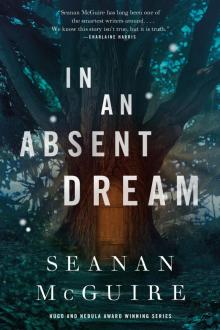 In an Absent Dream
In an Absent Dream Chaos Choreography
Chaos Choreography Indexing
Indexing Dusk or Dark or Dawn or Day
Dusk or Dark or Dawn or Day Down Among the Sticks and Bones
Down Among the Sticks and Bones The Razor's Edge
The Razor's Edge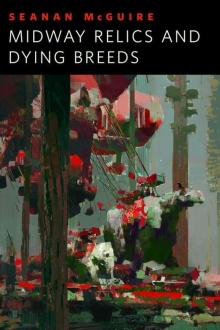 Midway Relics and Dying Breeds
Midway Relics and Dying Breeds Pocket Apocalypse
Pocket Apocalypse The Brightest Fell
The Brightest Fell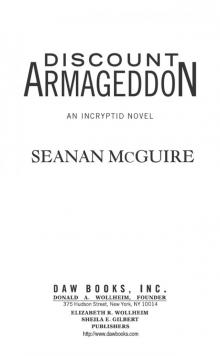 Discount Armageddon
Discount Armageddon Snakes and Ladders
Snakes and Ladders Chimes at Midnight
Chimes at Midnight Broken Paper Hearts
Broken Paper Hearts A Red-Rose Chain
A Red-Rose Chain Married in Green
Married in Green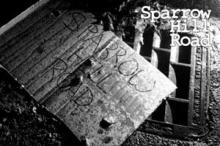 Sparrow Hill Road 2010 By Seanan
Sparrow Hill Road 2010 By Seanan Calculated Risks
Calculated Risks Laughter at the Academy
Laughter at the Academy The Winter Long
The Winter Long We Both Go Down Together
We Both Go Down Together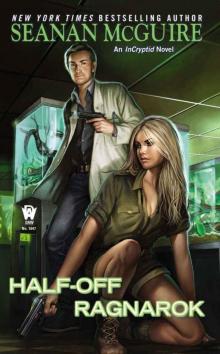 Half-Off Ragnarok
Half-Off Ragnarok Velveteen vs. The Seasons
Velveteen vs. The Seasons Boneyard
Boneyard A Killing Frost
A Killing Frost Late Eclipses
Late Eclipses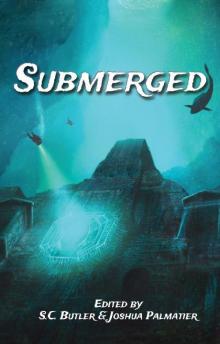 Submerged
Submerged Blocked
Blocked Velveteen vs. The Multiverse
Velveteen vs. The Multiverse Night and Silence
Night and Silence The Unkindest Tide (October Daye)
The Unkindest Tide (October Daye)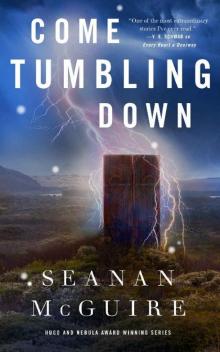 Come Tumbling Down (Wayward Children)
Come Tumbling Down (Wayward Children) Snake in the Glass
Snake in the Glass Magic for Nothing
Magic for Nothing Full of Briars
Full of Briars Oh Pretty Bird
Oh Pretty Bird The First Fall
The First Fall Once Broken Faith
Once Broken Faith My Last Name
My Last Name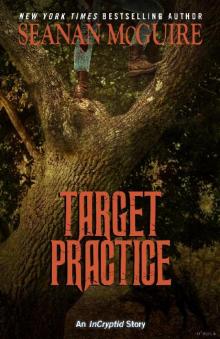 Target Practice
Target Practice Wayward Children 01 - Every Heart a Doorway
Wayward Children 01 - Every Heart a Doorway Sparrow Hill Road
Sparrow Hill Road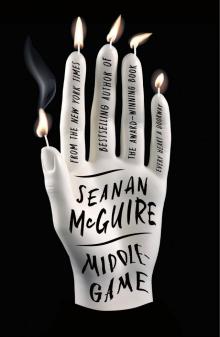 Middlegame
Middlegame Juice Like Wounds
Juice Like Wounds That Ain't Witchcraft
That Ain't Witchcraft Tricks for Free
Tricks for Free Imaginary Numbers
Imaginary Numbers The Star of New Mexico
The Star of New Mexico Lay of the Land
Lay of the Land One Hell of a Ride
One Hell of a Ride Bury Me in Satin
Bury Me in Satin Heaps of Pearl
Heaps of Pearl Sweet Poison Wine
Sweet Poison Wine When Sorrows Come
When Sorrows Come Every Heart a Doorway
Every Heart a Doorway An Artificial Night - BK 3
An Artificial Night - BK 3 Rosemary and Rue
Rosemary and Rue Black as Blood
Black as Blood Loch and Key
Loch and Key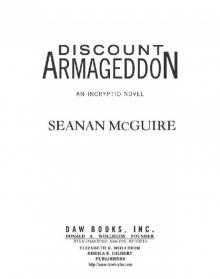 Discount Armageddon: An Incryptid Novel
Discount Armageddon: An Incryptid Novel The Unkindest Tide
The Unkindest Tide Ashes of Honor od-6
Ashes of Honor od-6 A Local Habitation od-2
A Local Habitation od-2 Waking Up in Vegas
Waking Up in Vegas The Ghosts of Bourbon Street
The Ghosts of Bourbon Street Midnight Blue-Light Special i-2
Midnight Blue-Light Special i-2 Bless Your Mechanical Heart
Bless Your Mechanical Heart Chimes at Midnight od-7
Chimes at Midnight od-7 The Way Home
The Way Home Indexing (Kindle Serial)
Indexing (Kindle Serial) Pocket Apocalypse: InCryptid, Book Four
Pocket Apocalypse: InCryptid, Book Four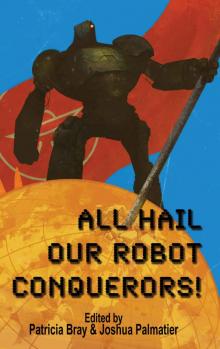 All Hail Our Robot Conquerors!
All Hail Our Robot Conquerors! Were-
Were- That Ain't Witchcraft (InCryptid #8)
That Ain't Witchcraft (InCryptid #8) Night and Silence (October Daye)
Night and Silence (October Daye) Late Eclipses od-4
Late Eclipses od-4 Ashes of Honor: An October Daye Novel
Ashes of Honor: An October Daye Novel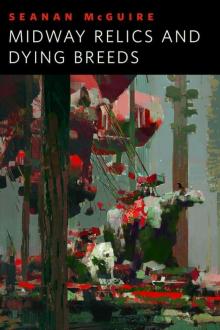 Midway Relics and Dying Breeds: A Tor.Com Original
Midway Relics and Dying Breeds: A Tor.Com Original Indexing: Reflections (Kindle Serials) (Indexing Series Book 2)
Indexing: Reflections (Kindle Serials) (Indexing Series Book 2) Chimes at Midnight: An October Daye Novel
Chimes at Midnight: An October Daye Novel One Salt Sea: An October Daye Novel
One Salt Sea: An October Daye Novel Rosemary and Rue od-1
Rosemary and Rue od-1 Rosemary and Rue: An October Daye Novel
Rosemary and Rue: An October Daye Novel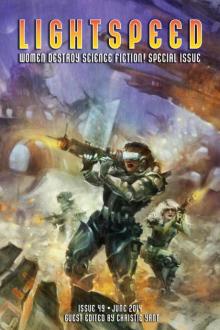 Lightspeed Magazine Issue 49
Lightspeed Magazine Issue 49 Alien Artifacts
Alien Artifacts One Salt Sea od-5
One Salt Sea od-5 An Artificial Night od-3
An Artificial Night od-3 Discount Armageddon i-1
Discount Armageddon i-1